I've been reading the C Primer Plus book and got to this example
#include <stdio.h>
int main(void)
{
float aboat = 32000.0;
double abet = 2.14e9;
long double dip = 5.32e-5;
printf("%f can be written %e\n", aboat, aboat);
printf("%f can be written %e\n", abet, abet);
printf("%f can be written %e\n", dip, dip);
return 0;
}
After I ran this on my macbook I was quite shocked at the output:
32000.000000 can be written 3.200000e+04
2140000000.000000 can be written 2.140000e+09
2140000000.000000 can be written 2.140000e+09
So I looked round and found out that the correct format to display long double is to use %Lf. However I still can't understand why I got the double abet value instead of what I got when I ran it on Cygwin, Ubuntu and iDeneb which is roughly
-1950228512509697486020297654959439872418023994430148306244153100897726713609
013030397828640261329800797420159101801613476402327600937901161313172717568.0
00000 can be written 2.725000e+02
Any ideas?
